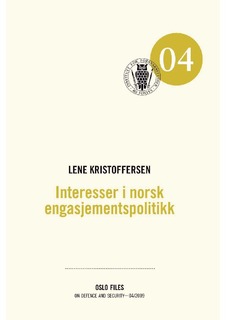Interesser i norsk engasjementspolitikk
Others

Åpne
Permanent lenke
http://hdl.handle.net/11250/99773Utgivelsesdato
2009Metadata
Vis full innførselSamlinger
Sammendrag
Since the end of the Cold War, Norway has become increasingly involved in peace building activities. This study looks into motives behind Norwegian peace diplomacy and peace building efforts, with a particular focus on the role of Norwegian interests. The cases of Guatemala, Bosnia-Herzegovina, Sri Lanka and Sudan, ranging in time from the late 1980s until today, have been chosen to see if and how these shed some light on Norwegian motives. What triggers Norway’s engagement, and what motives impel the Norwegian efforts? The study shows that the main driving force behind Norwegian peace building efforts has been humanitarian value-based motives rather than specific interests. This does not imply that interests have been insignificant. In the case of Bosnia, security considerations were essential. In the other three cases, traditional national interests such as security and economic incentives played a minor role. Still, other interests have motivated Norwegian peace building activism. Amongst these are prestige, visibility and access to central players and arenas. Advancing multilateralism in general and the UN in particular have also been important driving forces behind Norwegian efforts. Domestic pressure groups have furthermore triggered political action. Apparently, investing political resources in peace building generated various interests, and the value-based motives were increasingly supplemented by interests as time went by. At the same time: Norwegian peace building efforts were to a large extent due to ambitious individuals, who saw possibilities - and a Norwegian political and economic surplus which provided the necessary circumstances in which possibilities could be seized.